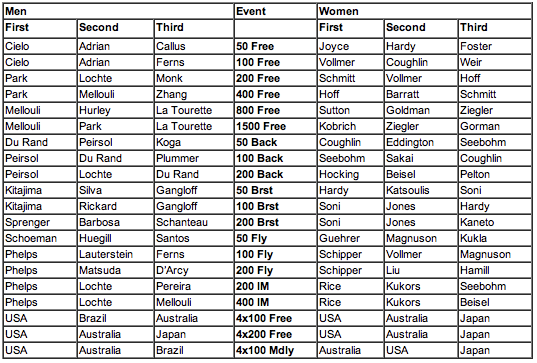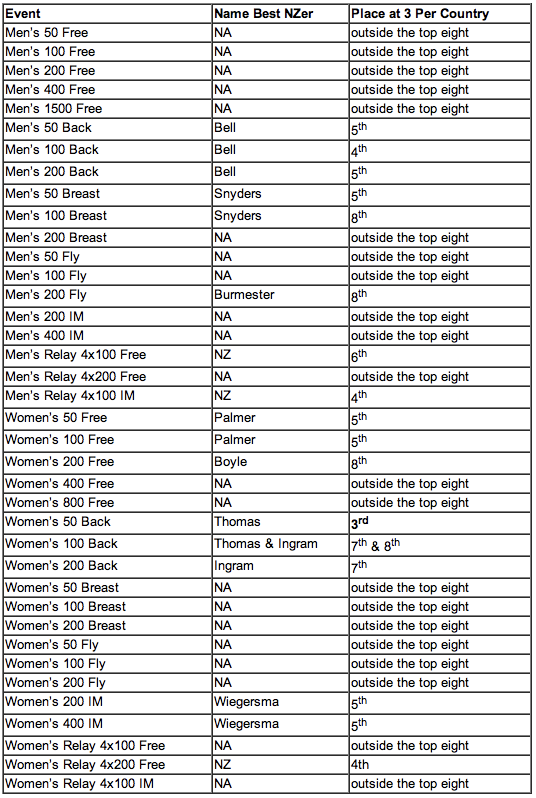By David
I was delighted to read a very special report written by Chris Rattue in the New Zealand Herald early this week. His article was primarily about the spat going on in Canoeing New Zealand over the position of Ben Fouhy and his eligibility for state funding. The report is reproduced on the New Zealand Herald website. It is worth a read in its entirety. Swimwatch will only quote the portions we think could just as easily be written about the perilous state of Swimming New Zealand. The place is falling apart and the comedy duo at the top doesn’t have a clue what to do about it.
Blanket regimes may have brought home medals under communist dictatorships. They worked a treat when ruthless coaches could frogmarch all the best young talent into gymnasiums, where they drilled the youngsters to exhaustion, drilled drugs into them, then spat the failures back into their bleak societies.
There is no serious evidence however that a government-funded system has done much for New Zealand sport, in encouraging growth or success on the world stage. Since Sparc – the latest funding conduit – arrived in 2003, things have only got worse. Tennis, golf, athletics, cricket, motor racing, speedway, swimming, triathlons, yachting, equestrian, canoeing … all of these and probably many more have seen far better days, and usually in the era when those who dreamed the dream did so without the government’s help and guidance.
The successors to Bruce McLaren, Denny Hulme, Chris Amon, John Walker, Peter Snell, Yvette Williams, Ivan Mauger, Russell Coutts, Onny Parun, Belinda Caldwell, Richard Hadlee, Mark Todd, Danyon Loader, Erin Baker and many, many more – where have they all gone?
The bottom line is that Sparc, and the environment it has encouraged, is hardly a roaring success. New Zealand sport reeks of problems brought about by an obsession with central control. Sparc is a political animal in charge of sport. This does not bode well. Backyard improvisation can no longer take on the world, but rugged individualism still can.
In 230 words Rattue has put his finger on the kernel of the problem. Jan Cameron marches along in the socialist state funded camp called the Millennium Institute. And the whole thing is not relevant. Olympic champions don’t come from that sort of environment any more. It’s a relic of the communist era, it’s out of date and it’s as effective as using a bucket to drain the Atlantic Ocean.
Michael Phelps trains away in his Baltimore Aquatics Swim Club. Ryan Lochte swims at his father’s club in Daytona Beach. Darra Torres prepared for Beijing in a pool just down the road from the one I coached at in Florida. Rebecca Soni uses the USC pool in Los Angeles, California. In every case their circumstances could be called “rugged individualism”. In every case they returned successfully from their Olympics. Something Cameron will never do from the Millennium Institute. And John Key’s promise to pour further millions into that bottomless Millennium pit is a classic case of good money after bad. A finance man like John Key should know better. Government assistance is appreciated. The socialist hand out way it is being spent is a serious problem.
I’ve been to Lochte’s home pool. It is a very modest affair. I’ve seen him helping out with his father’s learn to swim program. I’ve discussed the 100 kilometers a week he swims under his father’s tuition. It’s simple, it’s basic. It is “rugged individualism”. It does not have the hoards of doctors, physiotherapists, psychologists and spin doctors the Cameron empire requires. It also avoids the confusion those hangers on bring with them. But Lochte wins Olympic gold medals. He breaks world records. He is successful.
There was a wonderful program on New Zealand’s Television One recently. It covered a trip along the Nile by the British actress Joanna Lumley. Part of the Nile flows through Ethiopia. During this portion of her journey Lumley met a group of runners that included Meseret Defar. For those who may not recognize the name, Defar is the Athen’s Olympic and Osaka World 5000 meters champion. She holds the world indoor 3000 and 5000 meter records. This is how the Washington Post described what Defar and her friends did.
So that’s what the spunky girl with matchstick legs and a ponytail did. She ran along the rutted dirt roads of the Ethiopian highlands, barefoot or in torn sneakers, trying to improve her endurance. She ran up the wide, cracked steps to Meskel Square in the capital, while goats wandered by and clouds of pollution turned the air charcoal gray. And once she felt she was fast enough, she ran around the country’s only track, a rough ring of patched and potholed rubber inside Addis Ababa Stadium, hoping to be spotted by a running club and win a tiny sponsorship known as “calorie money.”
Like Rattue, I’d call what Phelps, Lochte and Defar do “rugged individualism”. I’d also call it successful.
There are pockets of that spirit still alive in New Zealand. Today I went to a swim meet that was arranged only yesterday. The purpose of the meet was to help a group of young Korean swimmers who were visiting New Zealand and wanted some “official” times while they were here. The CEO of Auckland Swimming, Brian Palmer, hired four lanes of a local high school pool and circulated an appeal for officials to help. The number and quality of officials that turned up was stunning. They could and frequently have run the finals session of Open National Championships. It was an example of all that’s good about sport in New Zealand. The fastest young Korean probably swam 100 meters freestyle in about 1.20. Our club had three swimmers join in as some competition, but that was not the point. Good New Zealanders were doing a good thing for all the right reasons. Today’s meet was the way New Zealand used to win. And if you don’t believe that read Rattue’s list of world champions again.
It’s not the way the Millennium Institute and Cameron do things though. They are above all that. The grassroots is not for them. I have been in my new coaching job at West Auckland Aquatics for 39 weeks. In that time I have attended 26 swim meets at New Zealand’s main competition pool, the West Wave Pool in Henderson. That’s in the City of Auckland, Jan Cameron’s home town. In that time I’ve seen her at just two of the 26 meets and I’ve seen her Millennium swimmers at three of those meets. Needless to say Cameron was nowhere to be seen today; nowhere to be seen when real swimming people were making this sport successful.
Like Rattue I’d call her way “problems brought about by an obsession with central control”; a socialist system that breeds sloth; a system that does not win. It’s also called having ideas way above your station. Good coaches never make that mistake. Good coaches never scorn the base degrees. Take Arch Jelley for example; coach of John Walker, the first man to break 3.50 for a mile and Olympic 1500 champion, but also coach of the Sunnybray Normal Primary School swimming team. He never scorns the grass roots. Take Steve Lochte; coach of his son Ryan, winner of numerous World and Olympic medals, but also the coach of the Daytona Beach bronze squad swimmers. He never scorns the grass roots.
Right or wrong, it’s my impression that Cameron looks on New Zealand as some sort of swimming incubator whose role in life is to breed swimmers for her and her son to inherit. The rest of New Zealand is a junior program whose role is to deliver swimmers to her and her off spring at the Millennium Institute. Well, that system has failed New Zealand for years. We are not involved in swimming to service Jan Cameron or her son. New Zealand coaches, including me, have coached fast swimmers in the past and when we do again I pray to God none of them go anywhere near that Millennium poisonous challis.
The Cameron version of socialist centralized control is well suited for looking after the nation’s weaker members; those requiring health care and those who are unemployed. It is not at all useful in world class sport. For that you need a program of “rugged individualism”. That’s where the next generation of New Zealand international champions will be found.






